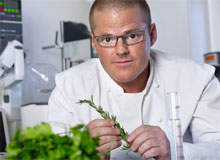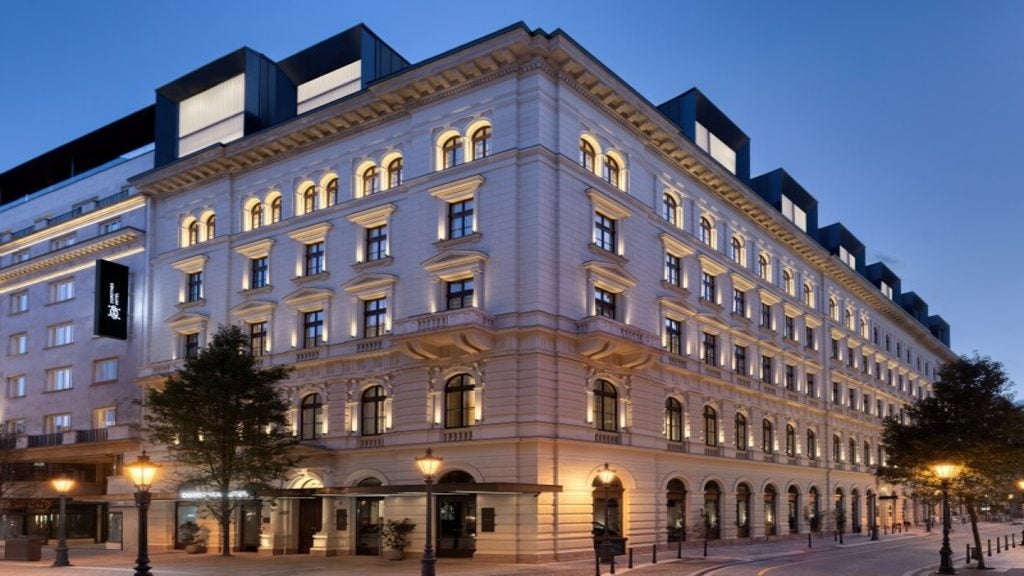
In a culinary world full of posturing super-chefs and competing egos, there is something particularly refreshing about Heston Blumenthal. Not only do his contemporaries not have a bad word to say about him – increasingly rare in the testosterone-fuelled UK restaurant scene – but his enthusiasm, inquisitiveness and flair have proved infectious far beyond the lofty realms of fine dining.
The man initially made famous by outwardly madcap concoctions such as ‘snail porridge’ and ‘bacon and egg ice cream’ is now something of a budding national treasure; instilling in a wider public consciousness ideas about food’s ability to evoke memory, emotion and fun.
As the figurehead behind one of only four three-star Michelin restaurants in the UK, nobody can doubt his credentials. The fact that he has established this profile while limiting his interests to two restaurants within the idyllic locality of Bray, a village 25 miles outside the capital, has only strengthened the impression of a man who shuns the glitzy world of Michelin empire building in favour of a more personal journey. But now Blumenthal is coming to London. And not just London, but Knightsbridge, the epicentre of the capital’s fine dining scene, installed in one of the city’s most prestigious addresses: the Mandarin Oriental Hyde Park.
The as yet unnamed venture is scheduled to open in December, but Blumenthal’s relationship with Mandarin goes further back than that.
“It was around six years ago, when the Fat Duck was winning its third star,” he reveals. “I was approached about whether I’d be interested in opening a Fat Duck in Tokyo. We were put on a plane and given a three-day whistle-stop tour of the city. It was quite an amazing ego massage. Being asked to go into business with a company like Mandarin in one of the most exciting food cities in the world; it was pretty seductive.”
See Also:
Discussions went on for several months, but as the initial euphoria dissipated doubts started to enter the chef’s mind.
How well do you really know your competitors?
Access the most comprehensive Company Profiles on the market, powered by GlobalData. Save hours of research. Gain competitive edge.

Thank you!
Your download email will arrive shortly
Not ready to buy yet? Download a free sample
We are confident about the unique quality of our Company Profiles. However, we want you to make the most beneficial decision for your business, so we offer a free sample that you can download by submitting the below form
By GlobalData“It would have involved losing key staff from the restaurant and the fear was that we would weaken what had got us there in the first place,” he reveals. “Overall, however, I slowly came to the conclusion that there simply shouldn’t be another Fat Duck. One must never say never because such pronouncements have a habit of coming back and biting you on the bum, but it’s the original labour of love. Having the restaurant anywhere else would feel strange.”
But this was not the end of the story: a man who had been instrumental in instigating that first meeting, David Nicholls, has since become F&B director at the Knightbridge property and he was not willing to give up just yet. A Blumenthal venue in London had been long-rumoured, but it would appear that this personal connection tipped the balance.
“I’ve known David a long time and have complete trust in his judgment,” he explains. “Also, the standards of the Mandarin brand gave it a big edge. Although we have control – it’s our menu and senior staff – their expertise in aspects such as HR and training, and the systems they have in place, leave us to focus entirely on the food and service.”
And the concept is certainly pure Blumenthal. Although he says the food will be pitched somewhere between the Fat Duck and his ‘gastropub’ the Hind’s Head, early indicators are that it will borrow as much from his recent television series, Heston’s Feast, in which he undertook a culinary journey through Victorian Britain, Tudor England and Ancient Rome, giving forgotten dishes a thoroughly modern twist.
“It’s an entirely new concept but sits within the realms of what I’ve been doing the last few years,” he explains. “We’re talking a smart brasserie with 130-odd covers inspired by historic British recipes. My name will be attached – ‘by Heston Blumenthal’ – and the dishes we’re working on at the moment are certainly of a Michelin star level, but it will in no way be a Fat Duck clone.”
As he describes those dishes it becomes clear that one will be unable to find an equivalent restaurant anywhere else in the world. Despite the popular perception of Blumenthal as an ultra modern ambassador for ‘molecular gastronomy’, the themes underpinning his food have always drawn on our historical and scientific heritage and focus on the emotional as much as the technical.
“I’ve already got ideas for afternoon tea, although there might be some cost and feasibility issues,” he chuckles excitedly. “Just across the park is the Royal Institution, where Mrs Marshall first suggested using liquid nitrogen to make ice cream and James Dewar invented the Dewar flask for its storage. I’ve been thinking about converting an old sewing table, attaching a foot pedal to a mixing bowl and, following her recipe from 1905, making and serving ice cream at the
table.
“It’s a great example of something inspired by history but resolutely now, creating a piece of kit that looks ancient but never actually existed. There’s a Wonderland element there and that’s something I’m keen to create.”
Another dish, ‘meat fruit’, was prompted by conversations with historians at Hampton Court Palace. Originally served by the Tudors in the 16th Century, balls of minced pork and veal were cooked on a spit, covered in savoury parsley custard and presented in the form of apples. Typically, Blumenthal has introduced a very personal twist with an irreverent wink at his new surroundings.
“We’ve managed to create mandarins,” he exclaims. “It’s a chicken liver parfait with a few other components, covered in mandarin jelly. It’s even got the dimples and leaf sticking out – look at it from six inches away and you wouldn’t know the difference.
“What I’d like is that you order a “fruit bowl” and it arrives at the table as such. Again, we’ve been inspired by an old recipe but have moved the idea along.”
Blumenthal is also keen to stress that less adventurous diners will still be able to get a great rib of beef or steak and chips, “perhaps served with an 18th century mushroom ketchup”, but the overall concept feels like a screaming departure from the rather staid world of five-star hotel dining. The only danger is that some diners, critics and rivals might interpret it as a little gimmicky.
“I’ve always been aware of that danger and it was something I addressed with the designer at the very beginning,” Blumenthal reveals. “The last thing we wanted was mock-something – like those dodgy salesman lunch venues where it’s all slap and tickle with flagons of ale and women dressed up as wenches. The actual room is thoroughly modern with a few exciting nods to the past.
“We’re entering a part of London with fantastic restaurants: Marcus [Wareing] is bang opposite, Pascal [Proyart] is cooking at the Sheraton, Zuma is just round the corner and Gordon Ramsay’s new Petrus is opening. This entire project has been taken extremely seriously and I’m under no illusions that I can just swing into town, put my name above the door and everything will fall into place. Getting the pitch right has been paramount.”
This has involved concerted design efforts to ensure that the restaurant does not suffer from the lack of atmosphere that so often afflicts five-star hotel dining rooms.
“There has to be a level of buzz,” Blumenthal declares. “The plan is to have no tablecloths other than at afternoon tea. I want to hear some real noise and create something that has real individuality but done in a relaxed way. People are so much more eager for that now than they were in the days of starched outfits and stuffy service. It’s also something London dining has pioneered.”
He may have taken his time arriving, but Blumenthal is clearly a fan of the capital’s dining scene and, with the benefit of hindsight, it seems far more appropriate that his first venture beyond Bray should be overlooking Hyde Park rather than downtown Tokyo. Although the ultra modern nature of his food might suggest otherwise, he has always been a thoroughly British chef.
“My food is rooted in British culinary culture and is proud to be so,” he begins. “We’ve never publicised the fact, but only one piece of seafood in my restaurant doesn’t come from British waters. Other than the pigeon and foie gras, all our meat is sourced within the UK. I did consider using 100% British produce for this venture, but that would have meant not staying true to the original recipes. There were periods in history when olive oil was commonly used and I didn’t want to lose that authenticity.”
Ensuring such authenticity has seen Blumenthal employ a former Penguin Books editor as researcher and archivist, spending her days at the British Library unearthing lost treasures of culinary history. Helping transform them into restaurant dishes is Ashley Palmer Watts. He has been with Blumenthal for over a decade, most recently as executive head chef at the Fat Duck, and will lead the brigade at the Mandarin Oriental while it finds its feet.
“He has long been my eyes and ears,” Blumenthal reveals. “Ash will walk through the dining room and spot exactly the same things that need changing as I would. I’d not have been nearly as keen taking on this project without him. We’ve been working on recipes together for the past few months and the plan is that he starts off in the kitchen full time until we establish a day-to-day operating team and head chef.”
Menu development continues apace, with 25 or so dishes already confirmed.
“I’d like to have 50 savoury dishes in our repertoire by the time of opening,” he explains. “The menu will be something like ten starters and ten mains, but we’ll have enough in our locker to revise 25%-30% with each menu change. Ideally that would see us through an entire year and then the process is ongoing, getting a model together that gives the resident head chef systems to work within but also leaves room for the kitchen to undertake development themselves.
“The unconstrained glee with which he discusses that development process suggests the menu will not be lacking in new ideas come December. While its inspiration may borrow from the past, one is left with the feeling that the future of London dining is about to be altered quite dramatically.







